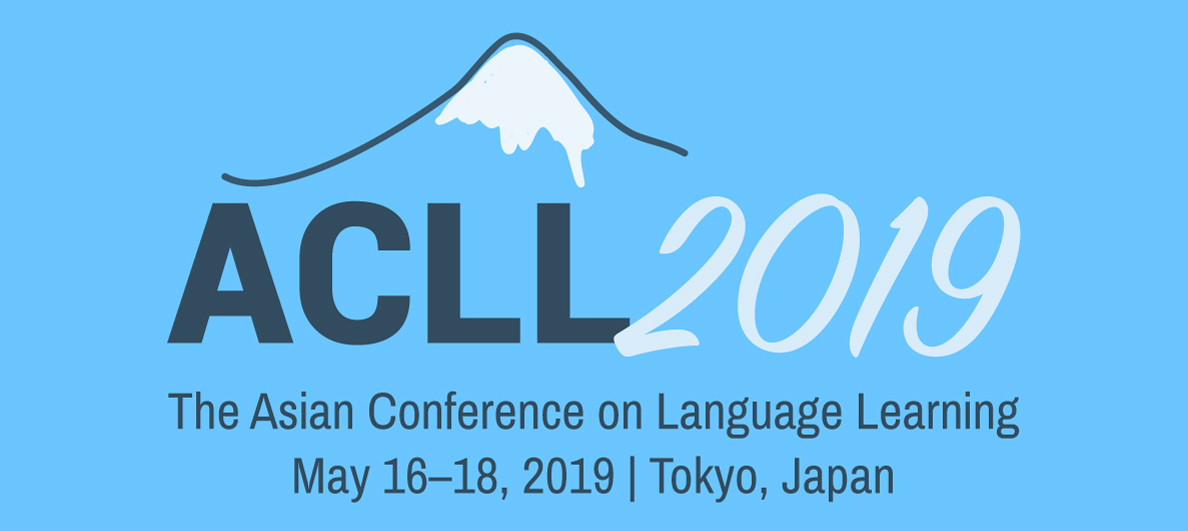Conference Theme: “Individual, Community, Society: Connecting, Learning and Growing”
April 17–20, 2014 | Osaka International Conference Center, Osaka, Japan
Conference Report
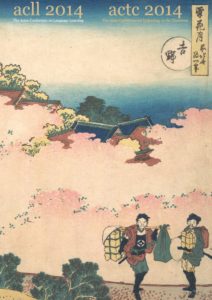 The Fourth Annual Asian Conference on Language Learning (ACLL) and the Fourth Annual Conference on Technology in the Classroom (ACTC) welcomed 255 delegates from over 40 nations to engage, debate, learn and interact through productive exchanges, and the sharing of professional ideas and opinions alongside their international peers. The theme of the 2014 joint conference was ‘Individual, Community, & Society: Connecting, Learning and Growing’ and sought to establish new ways of engaging with others, providing creative mechanisms for teaching and learning, as well as advancing and enhancing personal, community, and societal advancement.
The Fourth Annual Asian Conference on Language Learning (ACLL) and the Fourth Annual Conference on Technology in the Classroom (ACTC) welcomed 255 delegates from over 40 nations to engage, debate, learn and interact through productive exchanges, and the sharing of professional ideas and opinions alongside their international peers. The theme of the 2014 joint conference was ‘Individual, Community, & Society: Connecting, Learning and Growing’ and sought to establish new ways of engaging with others, providing creative mechanisms for teaching and learning, as well as advancing and enhancing personal, community, and societal advancement.
The joint conference got off to a great and convivial start with the well-attended welcome reception held at the Saint Louis Amuse, which established the highly positive and inclusive rapport that resonated within the conference. The Friday Plenary Session was once again very strong with two highly regarded senior academics as keynote speakers. The ACLL Keynote, Professor Kuniko Miyanaga is a cultural anthropologist and linguist and works on questions of globalisation, identity and language. Professor Miyanaga spoke on the closed epistemological and ontological circuit that exists within English language education in Japan. The ACTC Keynote Dr John Hope is the Associate Dean of International Programmes at the University of Auckland in New Zealand. Dr Hope is a highly regarded and respected education leader within the Asia Pacific region. His keynote titled ‘Improving School/Home Communication With Online Blogs’ elaborated on research that was instigated to investigate whether online parental access to classroom blogs could help to bridge the gap between home and school, thus encouraging enhanced school – home dialogue with a view to create improved student achievement. The plenary session closed with an optimistic and motivating address by the ACLL Conference Co-Chair Professor Steve Cornwell of Osaka Women’s University, Japan, whose ‘Answerless Riddles: Stories from Language Learning Classrooms’, was not only informative but highly entertaining.
The Organising Committee offers its grateful thanks to the five featured speakers at ACLL/ACTC2014. Professors Marjo Mitsutomi and Minna Kirjavainen of Osaka Gakuin University, Japan, Professor Shamim Ali of the Allama Iqbal Open University, Pakistan and Dr Roger Palmer of Konan University, Japan. We felt privileged to hear such wonderful insights and knowledge with our disciplines in such a positive and inspirational way. Our special thanks once again goes to our Conference Co-Chairs Professor Barbara Lockee of Virginia Tech., USA and Professor Steve Cornwell of Osaka Women’s University, Japan.
An important aspect of what makes our IAFOR Osaka conferences such a unique event is the opportunity for delegates to engage with traditional Japanese cuisine, arts and culture. The ACLL/ACTC conference dinner on Friday evening gave many first time visitors to Japan an experience of the delights of Japanese food. During the conference, delegates had the chance to hear the powerful Taiko drumming from leading Osaka based group Baliholic as well as attend a wonderful Japanese Calligraphy Workshop given by art students from Kyoto’s Ritsumeikan University.
This year’s conferences built upon the success of our previous 2013 joint conferences with returning delegates remarking that it was the best yet. The Organising Committee wishes to thank all delegates who attended the 2014 ACLL and ACTC Conferences for their fantastic contributions and enthusiasm.
Speakers
Kumiko Miyanaga
Human Potential Institute, Japan
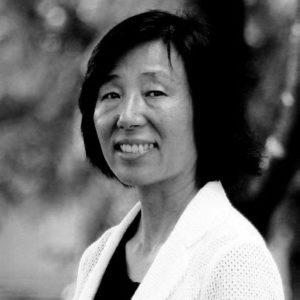 Kuniko Miyanaga is a cultural anthropologist and linguist and works on questions of globalization, identity and language. She has taught at the International Christian University in Tokyo (1974-2002), and from 2005 she joined the faculty at Tama University, as a Professor of Anthropology, also serving as Dean of the School. Professor Miyanaga is the founding and current director of the Human Potential Institute NPO, as well as the founding director of the IAFOR Language Research Institute.
Kuniko Miyanaga is a cultural anthropologist and linguist and works on questions of globalization, identity and language. She has taught at the International Christian University in Tokyo (1974-2002), and from 2005 she joined the faculty at Tama University, as a Professor of Anthropology, also serving as Dean of the School. Professor Miyanaga is the founding and current director of the Human Potential Institute NPO, as well as the founding director of the IAFOR Language Research Institute.
She has taught for periods abroad at the University of British Columbia, Canada, and was a Fulbright Scholar at St Michaels College, VT. USA. Professor Miyanaga has also been a Visiting Scholar at the universities of Boston, Harvard, and Stanford in the USA, and Oxford in the UK through the Japan Foundation.
Keynote Presentation: "Globalization, Culture and the individual--in an example from English education in Japan"
Culture offers an exclusive, epistemological system to make sense of the self and the world. Under cultural instructions, members see what and as they are supposed to see. The language is a major player of this role. This presentation focusses on how the same language and the culture may also offer a chance for the individual, speaker/observer, to go out of this closed epistemological and ontological circuit. The example is taken from English education in Japan.
The education filters the inferential and interactive structure of English which supports the speaker to move from the observation of the concrete to its abstract articulation through his act of reasoning. English is reduced to referential relationships, to be leveled with Japanese. The speaker loses the chance to articulate their individuation.
Here, two choices are available between continuing to filter inference and assimilating inference with reference. The latter may allow speakers to take advantage of the combination of English reasoning in abstraction and Japanese referential randomness/directness with the concrete, and to go out of fixations. The former continues to provide social security by trimming epistemological deviances.
The presentation stresses creativity by the speakers, which necessitates individuation, but not determinism.
John Hope
University of Auckland, New Zealand
 John Hope is the Associate Dean (International Programmes), at the Faculty of Education, University of Auckland, New Zealand and is a highly regarded and respected leader within the education profession. Dr Hope’s career in education has spanned over 4 decades, working initially as a primary school teacher then rising quickly through the teaching profession to become a principal of the largest metropolitan primary school in New Zealand. John was then selected to be an Inspector of Schools before moving into a senior curriculum writing and development role. John then embarked on an academic career at the University of Auckland. Since joining the Education faculty at Auckland, John has been a Lecturer, Program Director of Primary Teacher Training, and then Principal Centre Director. In his current role as Associate Dean International Programmes for the Faculty of Education, John Hope frequently travels throughout the University world, building academic alliances and establishing partnerships with a particular emphasis on the Asia-Pacific region and with other member universities of the global Universitas 21 group. John is passionate about quantitative and mixed method research with a particular interest in issues pertaining to international education, gifted education, educational leadership and of course has had lengthy experience within teaching, researching and leading ICT in Education.
John Hope is the Associate Dean (International Programmes), at the Faculty of Education, University of Auckland, New Zealand and is a highly regarded and respected leader within the education profession. Dr Hope’s career in education has spanned over 4 decades, working initially as a primary school teacher then rising quickly through the teaching profession to become a principal of the largest metropolitan primary school in New Zealand. John was then selected to be an Inspector of Schools before moving into a senior curriculum writing and development role. John then embarked on an academic career at the University of Auckland. Since joining the Education faculty at Auckland, John has been a Lecturer, Program Director of Primary Teacher Training, and then Principal Centre Director. In his current role as Associate Dean International Programmes for the Faculty of Education, John Hope frequently travels throughout the University world, building academic alliances and establishing partnerships with a particular emphasis on the Asia-Pacific region and with other member universities of the global Universitas 21 group. John is passionate about quantitative and mixed method research with a particular interest in issues pertaining to international education, gifted education, educational leadership and of course has had lengthy experience within teaching, researching and leading ICT in Education.
Keynote Presentation: "Improving School/Home Communication With Online Blogs"
New Zealand has a very different education to that in Japan. Like Japan, there are both strengths and weaknesses in the New Zealand education system. One of the strengths of the New Zealand education system that is different from Japan is that the schools are governed by Boards of Trustees, not by the Ministry of Education. Boards of Trustees comprise seven elected parents, the principal, one elected staff member and in the case of secondary schools, an elected student. Schools have a great deal of autonomy to make their own decisions, with the Boards of Trustees even deciding which teachers to hire, and whom to hire as principal.
The reason for giving so much power to New Zealand parents is to increase their involvement in the education of their children. But a governance role still does not inform parents about what is happening to their child in the classroom on a daily basis. The research outlined in this presentation was instigated to investigate whether online parental access to classroom blogs could help to bridge the gap between home and school.
A classroom at a New Zealand intermediate (middle) school in a lower socio-economic area was selected for the research location because the teacher and students of the class were compiling regular blogs about the teaching/learning process. The parents of the students were offered online access to the classroom blogs that the teacher and students had created, followed by a survey of the parent’s opinions about having online access to the classroom in this manner.
This presentation will outline the New Zealand education context and describe the results of the research project. Possible implications for Japan will also be discussed.
Steve Cornwell
Osaka Jogakuin University, Japan
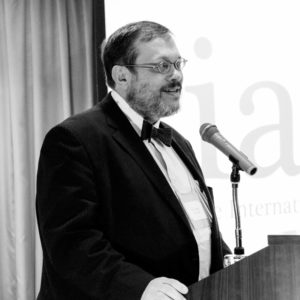 Steve Cornwell is Professor of English and Interdisciplinary Studies at Osaka Jogakuin University, and also teaches in the online portion of the MATESOL program for the New School in New York. He helped write and design several of the New School courses and has been involved with the program since its inception. He is involved with the Japan Association for Language Teaching (JALT) serving on its National Board of Directors. Since 2012 he has been the Committee Chair of Osaka Jogakuin University’s Lifelong Learning Committee and is responsible for their evening extension program geared at alumni and community members. He is also the Vice-Chair of Osaka Jogakuin University’s English Education Committee and recently served as the country coordinator for Teachers Helping Teachers’ Bangladesh Team. An American who has made Osaka his home, Professor Cornwell first became involved with IAFOR as a featured speaker at the first ACE conference in 2009, and has gradually become more involved in the organization, and in his capacity of Local Conference Chair, now assists in the logistical and administrative side of every event. He advises extensively on academic matters too, with particular responsibility for overseeing and developing the programs of the ACLL/ACTC conference in Japan, and the ECE/ECLL/ECTC event in the UK.
Steve Cornwell is Professor of English and Interdisciplinary Studies at Osaka Jogakuin University, and also teaches in the online portion of the MATESOL program for the New School in New York. He helped write and design several of the New School courses and has been involved with the program since its inception. He is involved with the Japan Association for Language Teaching (JALT) serving on its National Board of Directors. Since 2012 he has been the Committee Chair of Osaka Jogakuin University’s Lifelong Learning Committee and is responsible for their evening extension program geared at alumni and community members. He is also the Vice-Chair of Osaka Jogakuin University’s English Education Committee and recently served as the country coordinator for Teachers Helping Teachers’ Bangladesh Team. An American who has made Osaka his home, Professor Cornwell first became involved with IAFOR as a featured speaker at the first ACE conference in 2009, and has gradually become more involved in the organization, and in his capacity of Local Conference Chair, now assists in the logistical and administrative side of every event. He advises extensively on academic matters too, with particular responsibility for overseeing and developing the programs of the ACLL/ACTC conference in Japan, and the ECE/ECLL/ECTC event in the UK.
Featured Presentation: "Answerless Riddles: Stories from Language Learning Classrooms"
Some riddles have no final answers.
A few answerless riddles are still worth asking.
They are worth asking not for their answers, since they have none, but for what we do in struggling with them.
Earl Stevick, Teaching Languages: A Way and Ways
Earl Stevick is one of my favorite authors when it comes to language learning and teaching. I was first introduced to his work while a graduate student at the School for International Training in Brattleboro, Vermont. Ever since then I have remembered the quotation above as it sums up for me what we do as we try to make sense of our calling, our chosen profession—teaching. Using the conference theme, Individual, Community, Society: Connecting, Learning and Growing as a point of departure, let’s take some time to look at the riddles that are teaching and learning, technology and language. What’s the best way to teach? How can students learn more efficiently? How can technology fit into language learning? For me, these and questions like them are some of those answerless riddles that are worth asking. Let’s use this session to struggle with them as we “connect, learn, and grow” together.
Marjo Mitsutomi
Osaka Gakuin University, Japan
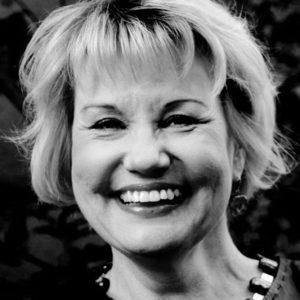 Marjo Mitsutomi is multilingual, and Professor and Executive Director of the Language Education Institute (LEI) at Osaka Gakuin University, Japan. Prior to her current position at OGU, she was academic director of three language acquisition programs at Akita International University, Japan. For many years, Dr Mitsutomi was on faculty at the University of Redlands in Southern California, where she taught in the School of Education’s graduate program, represented the entire university faculty as their elected president for academic governance, and served as director on the Orange County campus. A native of Finland, Dr Mitsutomi holds a Ph.D. in Applied Linguistics, is fluent in three languages and conversational in another three. Dr Mitsutomi has participated in several cross-disciplinary projects involving language development, planning and policy. She has consulted with the California Commission on Teacher Education and the United States Federal Aviation Agency (FAA). Her most notable contribution as a linguist was as co-author of the International Civil Aviation Organization (ICAO) aviation English proficiency standards for pilots and air traffic controllers worldwide. This ICAO proficiency standard (adopted by vote at the United Nations) governing both native and non-native speakers of English is the first global language mandate of its kind.
Marjo Mitsutomi is multilingual, and Professor and Executive Director of the Language Education Institute (LEI) at Osaka Gakuin University, Japan. Prior to her current position at OGU, she was academic director of three language acquisition programs at Akita International University, Japan. For many years, Dr Mitsutomi was on faculty at the University of Redlands in Southern California, where she taught in the School of Education’s graduate program, represented the entire university faculty as their elected president for academic governance, and served as director on the Orange County campus. A native of Finland, Dr Mitsutomi holds a Ph.D. in Applied Linguistics, is fluent in three languages and conversational in another three. Dr Mitsutomi has participated in several cross-disciplinary projects involving language development, planning and policy. She has consulted with the California Commission on Teacher Education and the United States Federal Aviation Agency (FAA). Her most notable contribution as a linguist was as co-author of the International Civil Aviation Organization (ICAO) aviation English proficiency standards for pilots and air traffic controllers worldwide. This ICAO proficiency standard (adopted by vote at the United Nations) governing both native and non-native speakers of English is the first global language mandate of its kind.
Minna Kirjavainen
Osaka Gakuin University, Japan
 Minna Kirjavainen is an associate Professor at the Language Education Institute at Osaka Gakuin University. She received her undergraduate degree in English Language from the University of Sussex, UK in 2004 and was awarded a PhD in Psychology (Language Acquisition) at the University of Manchester, UK in 2008. Her research focuses on the acquisition of complex syntax and morphology in monolingual English- and Finnish-speaking children, which she studies by using corpus and experimental methods. She has worked on several research projects and has collected the largest Finnish child’s language dataset to date in collaboration with the Max Planck Institute for Evolutionary Anthropology.
Minna Kirjavainen is an associate Professor at the Language Education Institute at Osaka Gakuin University. She received her undergraduate degree in English Language from the University of Sussex, UK in 2004 and was awarded a PhD in Psychology (Language Acquisition) at the University of Manchester, UK in 2008. Her research focuses on the acquisition of complex syntax and morphology in monolingual English- and Finnish-speaking children, which she studies by using corpus and experimental methods. She has worked on several research projects and has collected the largest Finnish child’s language dataset to date in collaboration with the Max Planck Institute for Evolutionary Anthropology.
Featured Co-Presentation: "First and Second Language Acquisition Researchers: the things that unite and separate us"
Language acquisition is a process that has recently been described as “chaotic.” Many factors contribute to the learners’ ultimate level of language mastery, and no single theory can exhaustively explain the processes in the learners’ brain. Not only second language learners but also native speakers show clear differences in their ability to express themselves and produce meaning in written and spoken form.
The presenters of this session, each an expert of either first or second language acquisition, have partnered to discuss language learning factors that are common among language learners whether they are children or adults. The purpose of this paper is to demonstrate that cross-disciplined work between first and second language researchers can be beneficial to both sides and can help enlighten and inform the work that is being done with children and adults.
Shamim Ali
Allama Iqbal Open University, Pakistan
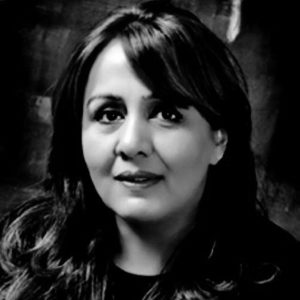 Shamim Ali is Assistant Professor in the Department of English language and Applied Linguistics in Allama Iqbal Open University Islamabad, Pakistan, having previously taught at the National University of Modern Languages. She received her Ph.D. in English Linguistics from National University of Modern Languages Islamabad, and has a long and distinguished academic career as an English language teacher. She is also an internationally published poet.
Shamim Ali is Assistant Professor in the Department of English language and Applied Linguistics in Allama Iqbal Open University Islamabad, Pakistan, having previously taught at the National University of Modern Languages. She received her Ph.D. in English Linguistics from National University of Modern Languages Islamabad, and has a long and distinguished academic career as an English language teacher. She is also an internationally published poet.
Dr Ali teaches English courses through communicative methods of teaching at Diploma, Certificate and Foundation Levels, and has planned, prepared and delivered lessons that cater to individual learning needs and styles. She has a considerable number of publications in the field of English language teaching.
Her research deals primarily with computer-mediated communication, intercultural communication, English as a lingua franca, and second language acquisition. Other research expertise includes epistemological and methodological issues in applied linguistics research. She is an editorial board member of several leading international journals, and serves as an external examiner and research supervisor at a number of universities in Pakistan and abroad. She has delivered invited lectures in many national and international conferences.
Spotlight Presentation: "Teaching English as a Foreign Language: Curriculum Development for Communicative Competence"
The discussion revolves around a research conducted on developing the most effective curriculum for students studying English as a foreign/second language. The aim of such a research is to analyze the ESL textbooks of a country on factors such as general criterion and teaching communicative competence. Communicative competence is extensively acknowledged as an excellent way to ensure a successful language teaching program. It is based on instilling proficiency in the target language by improving the abilities and potential of second language learners. The term communicative competence describes the learner’s proficiency and expertise in handling the target language in all kinds of communications in real life situations with confidence and understanding of how/when to use certain vocabulary items depending on contextual elements, however, this does not mean that the learner should have native like accuracy or fluency. This discussion is based on my research work regarding Pakistan’s ESL textbooks in which questionnaire and discussion methods were used. The questionnaire was based on certain significant elements identified from various checklists employed for material evaluation along with a section based on the four techniques of communicative competence. The completed questionnaire was submitted by English teachers who were teaching at different secondary levels from selected government schools, later followed by a description of the strengths and weaknesses of their respective textbooks. In the second phase, the four important areas of communicative competence were analyzed by selecting and evaluating the three main ESL text books being used in Pakistan. The framework will be shared with the audience to enable them to analyze the textbooks within their own respective countries.
Roger Palmer
Konan University, Japan
 Roger Palmer is associate professor at the Hirao School of Management, part of Konan University in Japan, where he serves as Co-director of Language Programmes. He has presented widely in Asia, notably as Plenary Speaker at ILANNS 2014 in Malaysia, Keynote Speaker at the UiTM Blended Learning Colloquium in 2013, Featured Speaker at MELTA in 2012, Featured Speaker at the Asian Conference on Technology in the Classroom 2011, and Plenary Speaker at TEFLIN Indonesia in 2010. From 2011 to 2013, he led a team investigating genre-based L2 writing and technology, working with fellow researchers in Japan and Indonesia. Roger has co-authored over a dozen textbooks for EFL/ESL learners of English, including iZone, Pearson Asia’s four-level print-digital course. He was the Site Chair for JALTCALL 2012, the Conference Chair for Peace as a Global Language in 2011, and serves as Membership Chair for Teachers Helping Teachers (THT), part of The Japan Association For Language Teaching, as well as THT delegate leader to Kyrgyzstan. His research interests include content-based instruction, genre-based pedagogy, ICT, and multimodality.
Roger Palmer is associate professor at the Hirao School of Management, part of Konan University in Japan, where he serves as Co-director of Language Programmes. He has presented widely in Asia, notably as Plenary Speaker at ILANNS 2014 in Malaysia, Keynote Speaker at the UiTM Blended Learning Colloquium in 2013, Featured Speaker at MELTA in 2012, Featured Speaker at the Asian Conference on Technology in the Classroom 2011, and Plenary Speaker at TEFLIN Indonesia in 2010. From 2011 to 2013, he led a team investigating genre-based L2 writing and technology, working with fellow researchers in Japan and Indonesia. Roger has co-authored over a dozen textbooks for EFL/ESL learners of English, including iZone, Pearson Asia’s four-level print-digital course. He was the Site Chair for JALTCALL 2012, the Conference Chair for Peace as a Global Language in 2011, and serves as Membership Chair for Teachers Helping Teachers (THT), part of The Japan Association For Language Teaching, as well as THT delegate leader to Kyrgyzstan. His research interests include content-based instruction, genre-based pedagogy, ICT, and multimodality.
Closing Session Featured Presentation: Helping language learners build knowledge
This talk will focus on ways to help learners build knowledge as they learn second or foreign languages, enabling them to join the target language community. In a country like Japan, where learners, teachers and the society of which they form a part share the same first language, other languages may be squeezed out even when there is a desire to learn them. Despite time, effort and good intentions, neither Willingness to Communicate (MacIntyre, Clément, Dörnyei & Noels,1998), nor skills training, nor Communicative Language Teaching has provided a viable way forward for those who wish to or need to learn other languages.
A solution put forward by Byrnes (2006) is to draw on lessons from Sociocultural Theory and Systemic Functional Linguistics, using functional descriptions of language in context to assist language learners. Drawing lessons from Byrnes (2006), three main areas are attended to. The first examines the need for a commitment to teaching language learners up to their potential, whether intermediate or advanced, in the target language. The second explores ways to help L2 learners understand meaning in the texts that they read and those they construct. Acceptance in a social or cultural group requires being able to analyse and break down a variety of texts and understand how they work. The third is the use of technology in language education. Technology represents one part of the solution, and it will be argued that technology should be embraced in the digital age just as it was embraced when it meant the printing press, or the pencil.
It follows that efforts be directed more towards the building of knowledge, by such means as integrating content and language instruction.
Works cited:
Byrnes, H. [Ed.] (2006). Advanced Language Learning: The Contribution of Halliday and Vygotsky. London: Continuum.
MacIntyre, P.D., Clément, R., Dörnyei, Z., & Noels, K.A. (1998). Conceptualizing willingness to communicate in a L2: A situational model of L2 confidence and affiliation. The Modern Language Journal, 82 (4), 545-562.
Organising Committee
Barbara Lockee
Virginia Tech, USA
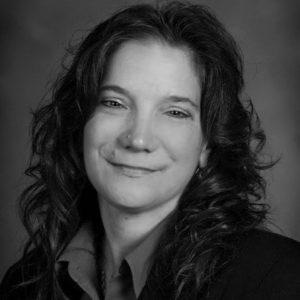 Barbara Lockee is Professor of Instructional Design and Technology at Virginia Tech., USA, where she is also Associate Director of the School of Education and Associate Director of Educational Research and Outreach. She teaches courses in instructional design, message design, and distance education. Her research interests focus on instructional design issues related to technology-mediated learning. She has published more than 80 papers in academic journals, conferences and books, and has presented her scholarly work at over 90 national and international conferences.
Barbara Lockee is Professor of Instructional Design and Technology at Virginia Tech., USA, where she is also Associate Director of the School of Education and Associate Director of Educational Research and Outreach. She teaches courses in instructional design, message design, and distance education. Her research interests focus on instructional design issues related to technology-mediated learning. She has published more than 80 papers in academic journals, conferences and books, and has presented her scholarly work at over 90 national and international conferences.
Dr Lockee is Immediate Past President of the Association for Educational Communications and Technology, an international professional organization for educational technology researchers and practitioners. She earned her PhD in 1996 from Virginia Tech in Curriculum and Instruction (Instructional Technology), MA in 1991 from Appalachian State University in Curriculum and Instruction (Educational Media), and BA in 1986 from Appalachian State University in Communication Arts.
Ted O’Neill
Gakushuin University, Japan
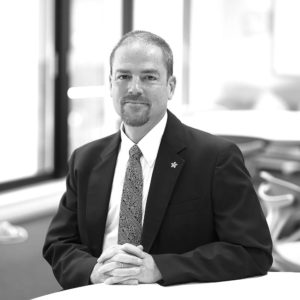 Ted O’Neill is a professor at Gakushuin University, Tokyo. He recently held the position of Associate Professor of English in the College of Liberal Arts and Sciences at Tokyo Medical and Dental University. Previously, he taught in the English Language Program at J. F. Oberlin University where he also served as Coordinator for the Foundation English Program. Ted was co-editor of The Language Teacher for the Japan Association for Language Teaching (JALT) and currently serves on the JALT National Board of Directors as Director of Public Relations. He received an MA in ESL and Bilingual Education from the University of Massachusetts/Boston, USA. Ted joined the Apple Distinguished Educator Program in 2011 and completed a postgraduate Certificate of Educational Technology and Information Literacy through the Graduate School of Education at the State University of New York in 2014.
Ted O’Neill is a professor at Gakushuin University, Tokyo. He recently held the position of Associate Professor of English in the College of Liberal Arts and Sciences at Tokyo Medical and Dental University. Previously, he taught in the English Language Program at J. F. Oberlin University where he also served as Coordinator for the Foundation English Program. Ted was co-editor of The Language Teacher for the Japan Association for Language Teaching (JALT) and currently serves on the JALT National Board of Directors as Director of Public Relations. He received an MA in ESL and Bilingual Education from the University of Massachusetts/Boston, USA. Ted joined the Apple Distinguished Educator Program in 2011 and completed a postgraduate Certificate of Educational Technology and Information Literacy through the Graduate School of Education at the State University of New York in 2014.
Steve Cornwell
Osaka Jogakuin University, Japan
 Steve Cornwell is Professor of English and Interdisciplinary Studies at Osaka Jogakuin College, and also teaches on the MA TESOL program for the New School at NYU. He holds an MFA from Virginia Tech, and an Ed.D. from Temple University.
Steve Cornwell is Professor of English and Interdisciplinary Studies at Osaka Jogakuin College, and also teaches on the MA TESOL program for the New School at NYU. He holds an MFA from Virginia Tech, and an Ed.D. from Temple University.
Professor Cornwell is Director of Program for the Japan Association of Language Teachers (JALT), and a member of their National Board of Directors. He is also a former editor of the JALT journal. An American who has made Osaka his home, Professor Cornwell first became involved with IAFOR as a featured speaker at the first ACE conference in 2009, and has gradually become more involved in the organisation. In his capacity as Local Conference Chair, he now assists in the logistical and administrative side of every event. He advises extensively on academic matters too, with particular responsibility for overseeing and developing the programmes of the ACLL/ACTC conference in Japan, and the ECLL/ECTC event in the UK.
Conference Videos
Kuniko Miyanaga
Keynote Presentation: “Globalisation, Culture and the Individual”
Marjo Mitsutomi & Minna Kirjavainen
Featured Presentation: “First and Second Language Acquisition”
Roger Palmer
Featured Presentation: “Helping Language Learners Build Knowledge”
